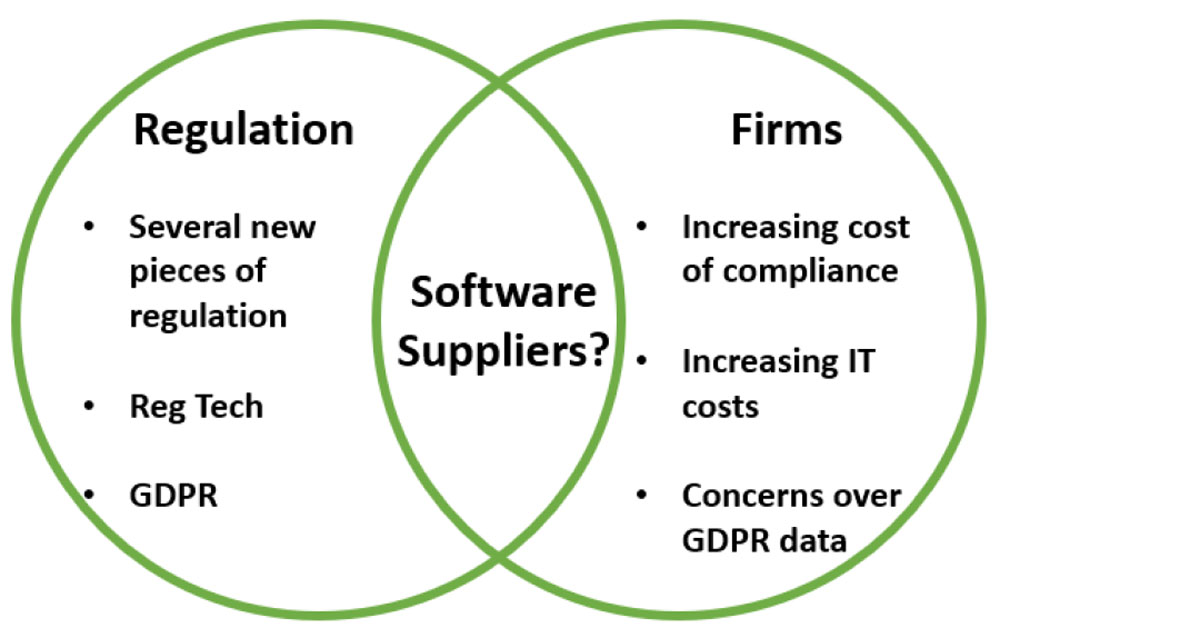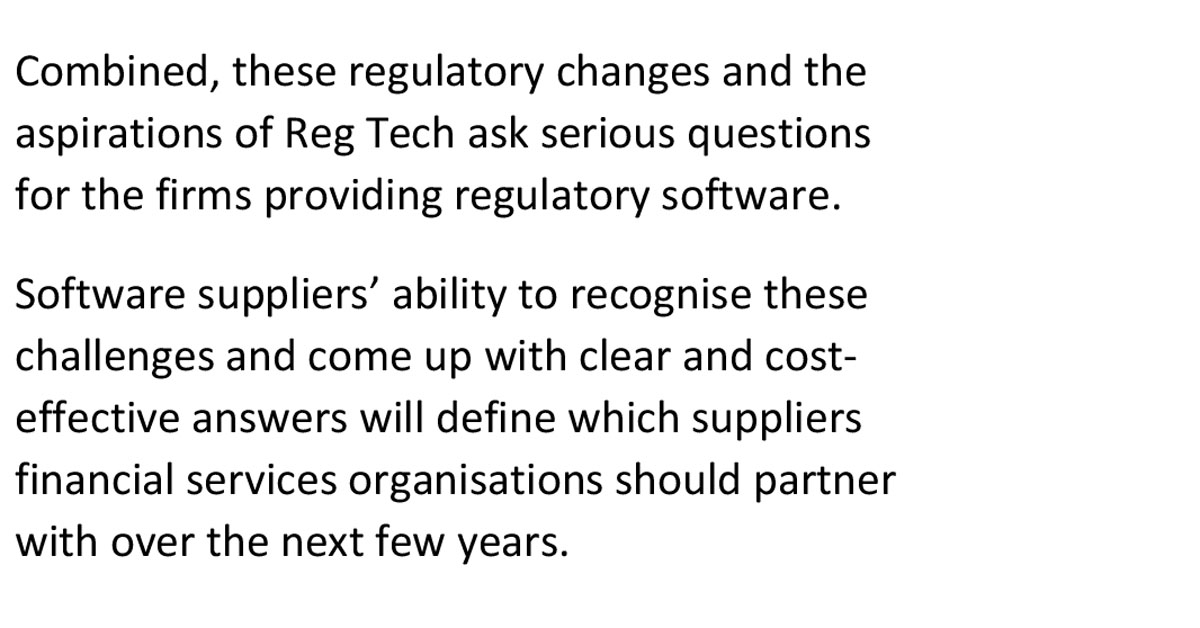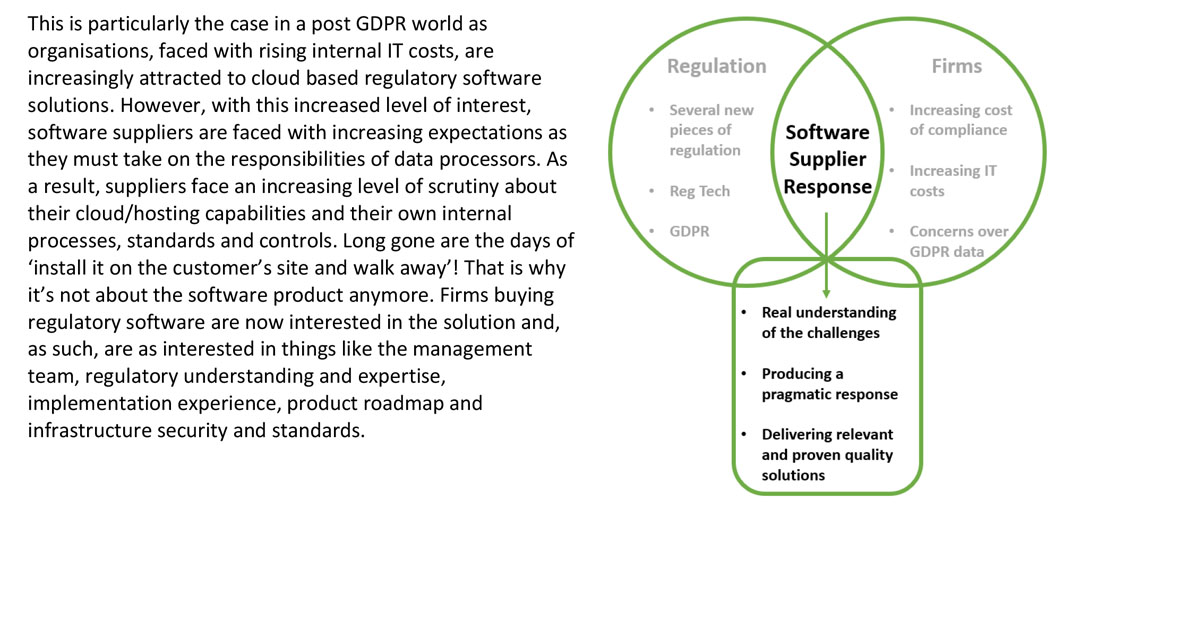Extensive change has been happening and continues to happen in the world of compliance. Major new regulation has been ‘landing’ for several years now and with SM&CR, the regulatory net is spreading wider than ever by the end of 2019. As firms adapt their business models and compliance teams race to align their processes in line with these regulatory demands and business model changes there has been quiet, but equally powerful, change in the demands asked of firms supplying regulatory software to UK financial services. However, before I expand on these changes, let me explain a little bit more these regulatory pressures.
The market challenges
The regulatory change has increasingly been introduced over the last few years, starting with Mortgage Credit Directive (March 2016), Markets in Financial Instruments Directive II (MiFID II, January 2018) and Insurance Distribution Directive (IDD, October 2018). Running through this has been the Senior Manager & Certification Regime (SM&CR) regulation which came into force for banks in March 2016 and Insurers from December 2018, it will be extended across financial services later this year (December 2019). This has not only caused firms to review and adjust their business models several times over, inevitably it has increased the level and cost of the additional compliance oversight. Running alongside all this has been the General Data Protection Regulation (GDPR – May 2018). GDPR may not have had quite the same impact as the other regulation on compliance, but it has had a major impact on their IT teams as they work out the practical impact of the GDPR regulation and their responsibilities regarding the information they hold, their relationship to that information, (i.e. data owner versus data processor), and adjust their management of the information in line with the new rules. Not exactly headline news, but GDPR has had a significant impact on IT in the last eighteen months. Alongside this the FCA, aware of the increasing cost of compliance, has been focusing on and promoting Reg Tech (a new field in financial services which utilises information technology to enhance regulatory processes and reporting). The vision is that managing regulation and reporting on performance against that regulation should harness technology to simplify and reduce the cost of compliance.
The real challenge is to go far deeper and actively engage with both customers and trade bodies to understand how different financial services firms are interpreting the new rules and the challenges it’s creating for them specifically

 Software supplier’s responses
Software supplier’s responses
In a competitive market, software suppliers have no choice but to ‘front up’ to these challenges. But what differentiates the average from market leading suppliers are three things; the understanding of these challenges, the commitment to producing a pragmatic response and the quality of solution in overcoming these challenges. Taking each in turn;
Understanding the challenges
It is easy for software suppliers to read the new regulation, make their own interpretations of what these rules mean in practice and adapt their products and functionality accordingly. The real challenge is to go far deeper and actively engage with both customers and trade bodies to understand how different financial services firms are interpreting the new rules and the challenges it’s creating for them specifically. All firms have different operating models, different mixes of IT systems, different compliance and IT standards and so on. Good software suppliers need to demonstrate a true, empathetic understanding and be brave enough to challenge through real practical experience, asking the questions and be ready to accept the multiplicity of answers they will inevitably get back.
 Producing a pragmatic, ‘whole supplier’ response
Producing a pragmatic, ‘whole supplier’ response
If software suppliers think deeply about these market driven challenges, it will inevitably lead to challenging themselves on a regular basis. These internal challenges will range from the quality of their regulatory expertise, i.e. ‘do we really understand what the regulation is trying to achieve?’, their products, i.e. ‘are we delivering intuitive functionality underpinned by the latest, industry standard technology?’ and, finally, their infrastructure, i.e. ‘are our data hosting and internal security processes meeting the highest standards?’
Inevitably, these challenges will cause tension internally however the best software suppliers understand these challenges cannot be ducked and that these tensions are the signs of the reinvention necessary to stay at the front of the industry in support of their customers. Whilst tough, the prize for software suppliers is greater trust from customers gained through a demonstration of holistic understanding of their specific challenges resulting in a willingness to listen to suppliers’ suggestions for innovative ways to deliver the regulatory compliance customers need in a frictionless, almost incidental, way.
Relevant and Proven Solution
And, at its simplest level, when launching new products and delivering product upgrades, continual focus needs to be given to;
- True practical understanding of what the software must actually deliver in very real and practical terms.
- ‘Ease of use’ i.e. the software must be easy to use for every type of end user, e.g. employee, line manager, central team and senior manager. Importantly, the software must be sufficiently intuitive that it can be navigated by end users even if they only log into the software on an occasional basis.
- Operational dashboards, i.e. management oversight at the ‘touch of a button’ plus simple drill down to case / incident level.
- Regulatory reporting, i.e. producing exactly what the regulator requires in a single click.
Finally, all this needs to be done whilst keeping the price at an attractive level to potential purchasers!
Moving forward
Make no mistake, these factors pose real challenges for software suppliers in the ‘regulatory space’. However, I am in no doubt that the quality of the response to these challenges will separate the good, and ultimately, successful software suppliers from the ‘also-rans’.
To succeed, suppliers will need to take a long-term view, to develop their relationships with customers and trade bodies as much as their product and be prepared to invest heavily in their infrastructure, their internal processes and, last but not least, their people.
As Bill Shankly, the famous Liverpool FC manager fifty years ago, once said; ‘this is a marathon, and you can’t sprint marathons’. Success will be an accumulation of thousands of small things over a sustained period of time.
In my view, that is what financial services firms should look for in their regulatory software suppliers.




